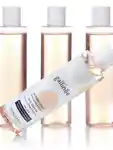But could your skin reap the benefits too? Gallinée founder Dr Marie Drago is changing the game with an unlikely skincare ingredient: bacteria.
They say that every great scientist has their ‘ah ha!’ moment. For Marie Drago, a Paris-born, London-based pharmacist and founder of Gallinée skincare, that flash of genius occurred during a trying time in her own health. While seeking support to manage her health concerns, she began to introduce fermented foods into her diet.
“Taking care of your gut works so well,” she told us, which led to her wondering, “what happens if you care for your skin bacteria?” Read on to find out!
It all started with Probiotics
Learning to Unlearn
OK, so this might go against everything we’ve been told since birth: bacteria = bad, clean = good. This is particularly true when it comes to skin problems: most anti-acne treatments aim to kill bacteria and if you suffer eczema, you’ve likely been prescribed antifungals or antibiotics since day one. This, says Drago, is where we’ve been wrong. "We’ve got a very clean lifestyle," she says. "We use a lot of antibiotics and antibacterials. We wash a lot, and yes, pollution plays a role too. But what happens is the damaged microbiome doesn’t do what it’s born to do, and so we get inflammatory reactions."
Like your gut, your skin carries its own bacteria. And these bacteria play a protective role. "The idea of my skincare is not only to bring probiotics, foreign bacteria and new bacteria to the skin but to put your own microbiome to work," Drago explains. "We do that by feeding your bacteria with prebiotics, which are nutrients specific for the good bacteria. We use lactic acid, which helps to select the bacteria on the skin and give them the best environment possible."









